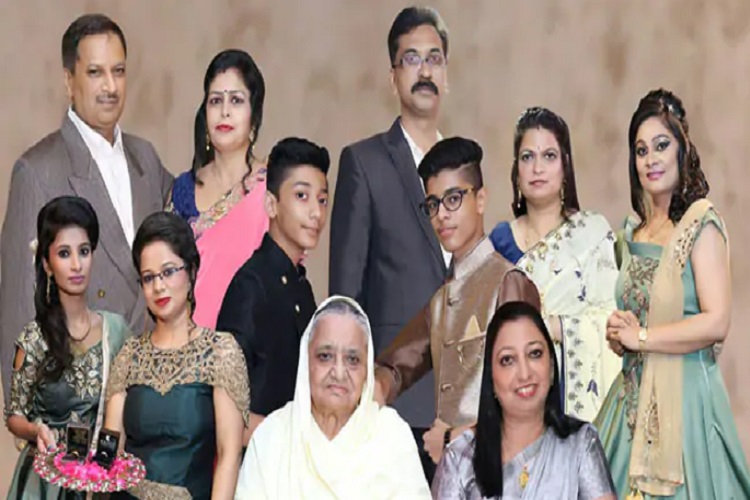It's been one week since 11 members of the Burari-based Chundawat family were found dead under mysterious circumstances inside their house. Even after one week, the police has yet to come out with an answer to the puzzle related to the murder mystery.
In the latest findings by the Delhi Police, they say that the whole murder mystery was masterminded by Narayani Devi's youngest son Lalit and his wife Tina. According to police officials, it was them who persuaded the other nine members into committing suicide. They even saw their own family members committing suicides.
The sensational murder came to light last Sunday when ten of the 11 members of the family were found hanging from an iron-mesh in the ceiling on Sunday, while the body of 77-year-old Narayan Devi, the head of the family, was lying on the floor in another room of the house. Her daughter Pratibha (57) and two sons Bhavnesh (50) and Lalit (45) were among the deceased. Bhavnesh's wife Savita (48) and their three children - Maneka (23), Neetu (25), and Dhirendra (15) were also found dead.
The others who were found hanging were Lalit's wife Tina (42), their 15-year-old son Dushyant and Pratibha's daughter Priyanka, who was engaged last month and was supposed to get married by year-end. On Wednesday, the police had recovered CCTV footage that showed some members bringing stools and wires that were used for their hanging. They had also found 11 diaries which had "psychological musings" and things about attaining "road to God".

The family members kept alleging that it was a murder but found it hard to point to a motive while dismissing suicide theories saying that the family was a "prosperous one" and had no "financial issues".
The investigators registered a murder case since the 77-year-old Narayan Devi was found lying in a room on the floor, and initially it was suspected she had been strangulated but the initial autopsy report suggested that all the members had died of hanging, more or less cementing the fact that it was a case of suicide.
But the mystery lingered as to why a prosperous family, that was doing well for itself, would take such an extreme step.
The answers were found in notes recovered from the house by the police which had writings about 'badh tapasya', getting into a banyan-tree like formation to attain something great, finding the 'road to God' and detailed notes about tying feet and hands, and covering mouths to appease God.
ALSO READ| The mystery endures: Burari deaths put spotlight on occult practices
More morbid details emerged as it was found in the notes that Lalit Singh Chundawat, Narayan Devi's younger son, had started getting "visitations" from his father, who had died in 2007" and it was on his instructions that from March this years, notes about replicating "badh tapasya" were being written.
It had also mentioned that the members would not die and Lalit's father's spirit would come and save them.
"The sky and earth will start shaking but you need not fear. I will come and rescue you," one of the notes mentions.
Lalit's elder brother, Dinesh Singh Chundawat, who lives in Kota, Rajasthan and his sister, Sujata Nagpal, who lives in Panipat, told the police that they had no idea about the notes or the 11 registers maintained by their families in the last 11 years.
"Dinesh started sweating when we showed him photocopies of the notes. He said that he had no idea about the notes or registers," said one of the investigators.
Some family members of Lalit's wife Tina, however, told police that they had heard Lalit being visited by his father's spirit and him assuming his father's alter-ego. The family, meanwhile, has accused media of portraying them as one that practices occult.
Police, who had unofficially consulted doctors at VIMHANS for the case, were informed that the family could have been suffering from 'shared psychosis', in which one person's delusional beliefs are shared by others.
But how could it be that no one opposed Lalit, not even one of his elder brother's daughters,who was pursuing Masters in Forensics?
"Delusional people are quite convincing, experts have told us. Lalit was quite loving towards his family but he exercised considerable control on the family, including his elder brother.
"The children would not even try to disobey what he said, probably because they thought he was like their grandfather," said an officer.
With things pointing towards psychological issues as being at the centre of the tragedy, police are likely to carry out psychological autopsy, a relatively new investigative technique earlier adopted in Sunanda Pushkar death case and Aarushi Talwar murder case.
A police officer said that psychological autopsy is secondary form of investigation but it is admissible as evidence, as is clear from Pushkar's case in which the police filed the chargesheet, on the basis of it.
In psychological autopsy, there is a reconstruction of the psychological state of the deceased just before or in the final moments of death based on interviews of the victims kin, narratives of the social and occupational contacts and other records.
It may extend backward to a few weeks or months.
"But here the difficulty is that it is not just about one individual, there are 11 members and no family member living in that house is alive and so the reconstruction will be limited. However, there are plenty of written records, an analysis of which will confirm the impressions the police already seem to have made," IHBAS director Nimesh Desai said.
Police are now awaiting the post-mortem report so that they can initiate the process of psychological autopsy.
